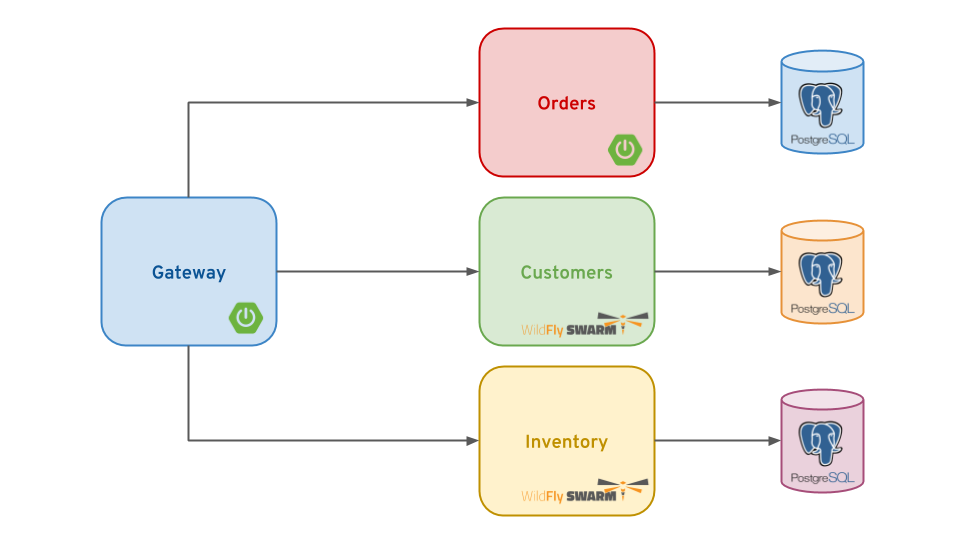This repository contains the source code used as demo for the talk Openshift Reloaded: Microservices 2.0 with RHOAR" held at the Openshift Madrid Meetup in February 22nd, 2018 (slides here). The aim of this demo is to showcase the features included in Red Hat Openshift Application Runtimes, focusing on Spring Boot and Wildfly Swarm. Instead of presenting a complex use case, the demo focuses on all the wiring and configuration required to enable all RHOAR's answers to several of Microservices' challenges (distributed tracing, externalized configuration, circuit breaker...) using the latest GA available.
The demo includes 4 microservices:
- Customers: Stores all customer related data. Developed using Wildfly Swarm and PostgreSQL as data store.
- Inventory: Stores detailed information about products. It uses the Wildfly/PostgreSQL stack as well.
- Orders: Manages all order related entities. It stores only UIDs to refer to Products and Customers. Implemented with Spring Boot and using a PostgreSQL database.
- Gateway: Access and aggregation layer for the whole application. It gets orders data and aggregates Products and Customers detailed information. Also implemented with the Spring Boot/PostgreSQL stack.
It can be argued that the domain is too fine grained for the modeled business, or that the approach is not optimal for data aggregation. While these statements might be true, the focus on the demo was to present a simple case with microservices interacting with each other, and shouldn't be considered a design aimed for a production solution.
All microservices have been designed to make use of externalized configuration, even though all follow a config-file approach. The ones implemented with Spring Boot use Spring Cloud Kubernetes to get configuration from a ConfigMap once it has been deployed in Openshift. This ConfigMap can be created using the following command (from the src/main/java/resources directory):
oc create configmap orders-config --from-file=application.properties=application-openshift.properties
Note that the application-openshift.properties file is renamed to application.properties. This is done because Spring Cloud Kubernetes looks for that exact file name inside the ConfigMap to which it points, included in the file bootstrap.properties.
As no OCP/Kubernetes integration plugin exists for the moment for Wildfly Swarm, the approach is slightly different in that case. For both services, a Fabric8 resource fragment is included in the src/main/fabric8 directory of each project, configuring a DeploymentConfig object pointing to a ConfigMap volume with the project-defaults.yml (renamed from bundled the project-openshift.yml file) configuration file. ConfigMap creation command would be as follows in this case:
oc create configmap inventory-config --from-file=project-openshift.yml
Note: Skipping this step before deploying the applications will result on startup errors and a failed deployment.
All projects have been configured to be easily deployed in OCP using the Fabric8 Maven Plugin. In order to perform a deployment, first login to the cluster using the oc CLI and change to the target project:
oc login <target_cluster>
oc project <target_project>
Running the following command after that will result on the application being deployed in the current OCP project:
mvn clean fabric8:deploy -P openshift
As stated before, Orders, Inventory and Customers services require a PostgreSQL database instance, so the PosgreSQL template can be used. Data initialization is performed at application startup from import.sql and load.sql files.
Applications can also run locally for testing purposes. In this case, the command to be used varies between Spring Boot and Wildfly Swarm. In the first case, the command is as follows:
mvn clean spring-boot:run -P local
For Wildfly Swarm, the command is the following:
mvn clean wildfly-swarm:run -P local
All microservices are based on the Opentracing API for distributed tracing, using the Jaeger implementation for that.
In order to have a Jaeger instance running in OCP, the development template available in the official Jaeger Github site was used.
